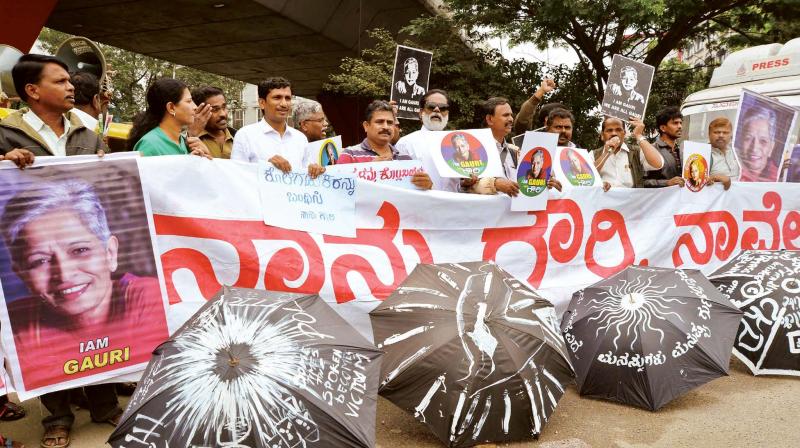Gauri Lankeshs murder: Can't go scot-free even if murder weapon not discovered

First, we heard that the famed Scotland Yard police from London was somehow assisting our Special Investigative Team (SIT) to crack journalist/activist Gauri Lankesh’s murder. Then, we learnt that it was all a lie. Now, after months of being tightlipped about the progress of the case, the SIT is pointing to two men and to volumes upon volumes of alleged confessions and hypothesis to claim it is nearly done with the investigation. But there’s growing discussion about what happened to the murder weapon and whether its absence will weaken the SIT’s case.
Sometimes we hear about acquittals in murder or assault cases where the police could not recover the murder weapon. And some of our legal professionals also strongly emphasise the absence of the weapon in their defence of the accused. But what does the law say about this?
In some countries (India is, fortunately, not one of them) where the police are freely allowed to torture an accused, extract a confession and pass it off as proof of his guilt, it is expected to force him to also reveal the whereabouts of the murder weapon and help convince the courts. But in a more evolved and complex criminal justice system such as ours, there’s not much space for the notion that the discovery of the murder weapon strongly proves the guilt of the accused or its absence proves his innocence.
To begin with, in India, the police is not allowed to torture an accused. And, more importantly, in an overwhelming number of criminal cases, an accused has the right to remain silent both during the investigation and the trial. What this means is that in our system of criminal jurisprudence, it is for the police to prove its case in court and the accused doesn’t need to say anything. This statutory and Constitutional limitation upon the power of the police colours a large number of our legal principles that determine whether a given legal evidence if admitted in trial proves the accused guilty beyond reasonable doubt.
Take the Gauri case. If the accused is indeed involved in her murder but will not divulge the whereabouts of the murder weapon, what is the police supposed to do? Is it even humanly possible to go about searching every place that the accused had been to after the murder? So if the police does not recover the murder weapon even after keeping the accused in its custody for a significant period, one can either presume that it has the wrong person or that the accused simply remained tight-lipped despite rigorous questioning.
Still, the absence of the murder weapon has often engaged the attention of our courts. And you will find an ample number of judgments of our Supreme Court saying no when asked by the accused to let them off primarily because of it. Our Supreme Court has been forced to say the same thing over and over again, that the non-discovery of the murder weapon is not a reason to let off the accused.
Finally, in the case of Gauri, the murder qualifies as one of the rarest of cases and may warrant the death penalty depending upon the degree of evidence uncovered by the police. However, it’s still not clear whether the SIT has made any progress whatsoever in this case and if those in its custody are really connected to the murder .
In any criminal case, first comes the investigation by the police and only if it manages to convince a judge in writing and through evidence and material in a chargesheet is the accused put on trial. However, in corruption cases, the government may stall the trial of a corrupt public servant by withholding sanction after investigation and stop it from proceeding.
Around four years ago, I had launched a very vocal public fight against a series of judgments of the Karnataka High Court, one of which ruled that the government’s sanction was necessary to even investigate a public servant on a charge of corruption. This was so absurd in law and precedent that I said so publicly. But within no time, a Bench of our Supreme Court too agreed with the Karnataka High Court. In response, I was counseled by my lawyer friends to simply ignore it all and move forward. I didn’t budge, however and took my opposition national. Within a short time increasing criticism of such judgments from many quarters led the Karnataka High Court to reverse its order. So, the moral of the story here for lawyers is if somebody tells you things about the criminal law that may seem very absurd on sustained reasoning, don’t believe them. You should doubt them and publicly.
(The writer is an advocate in the Supreme Court)

